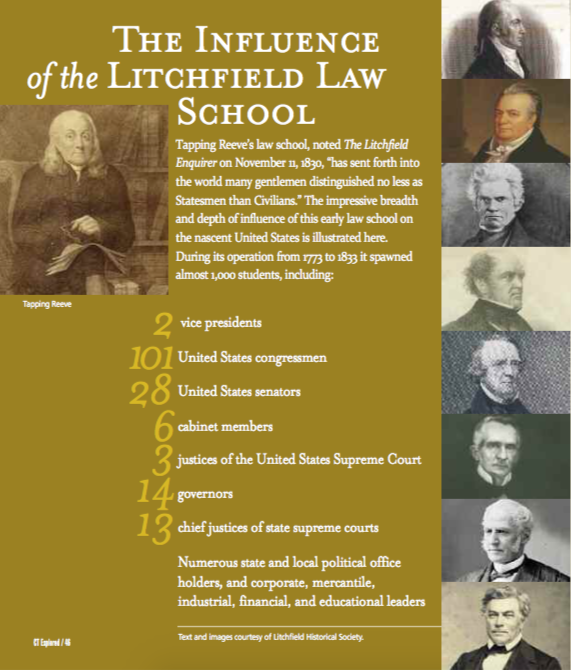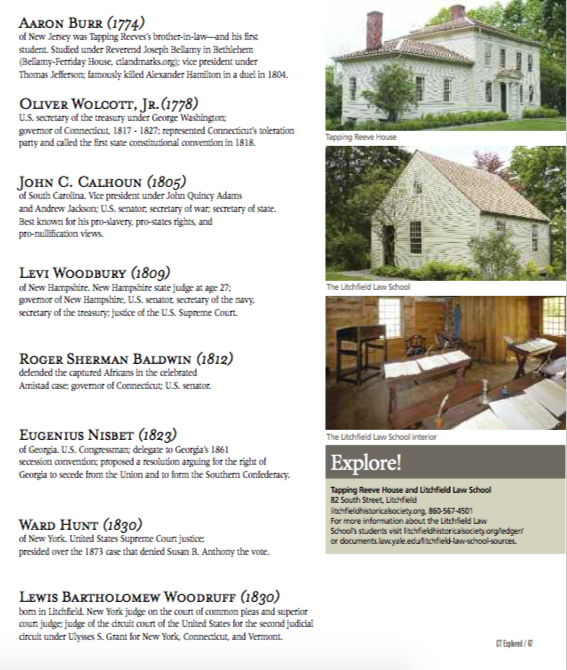Text and images courtesy of Litchfield Historical Society.
(c) Connecticut Explored Inc. Fall 2016
SUBSCRIBE/Buy the Issue
Tapping Reeve’s law school, noted The Litchfield Enquirer on November 11, 1830, “has sent forth into the world many gentlemen distinguished no less as Statesmen than Civilians.” The impressive breadth and depth of influence of this early law school on the nascent United States is illustrated here. During its operation from 1773 to 1833 it spawned almost 1,000 students, including:
2 vice presidents
101 United States congressmen
28 United States senators
6 cabinet members
3 justices of the United States Supreme Court
14 governors
13 chief justices of state supreme courts
State and local political office holders
Corporate, mercantile, industrial, financial, and educational leaders
TOP TO BOTTOM: The year in which the individual attended the law school is noted in parentheses; place of birth is listed for those not born in Connecticut.
Aaron Burr (1774) of New Jersey was Tapping Reeves’s brother-in-law—and his first student. Studied under Reverend Joseph Bellamy in Bethlehem (Bellamy-Ferriday House, ctlandmarks.org); vice president under Thomas Jefferson; famously killed Alexander Hamilton in a duel in 1804.
Oliver Wolcott, Jr. (1778) U.S. secretary of the treasury under George Washington; Governor of Connecticut, 1817 – 1827, represented the toleration party and called the first state constitutional convention in 1818.
John C. Calhoun (1805) of South Carolina. Vice president under John Quincy Adams and Andrew Jackson; U.S. senator; secretary of war; secretary of state. Best known for his pro-slavery, pro-states rights, and pro-nullification views.
Levi Woodbury (1809) of New Hampshire. New Hampshire state judge at age 27. governor of New Hampshire, U.S. senator, secretary of the navy, secretary of the treasury, justice of the U.S. Supreme Court.
Roger Sherman Baldwin (1812) defended the captured Africans in the celebrated Amistad case; governor of Connecticut; U.S. senator.
Eugenius Nisbet (1823) of Georgia. U.S. Congressman; delegate to Georgia’s 1861 secession convention; proposed a resolution arguing for the right of Georgia to secede from the Union and to form the Southern Confederacy.
Ward Hunt (1830) of New York. United States Supreme Court Justice; presided over the 1873 case that denied Susan B. Anthony the vote.
Lewis Bartholomew Woodruff (1830), born in Litchfield. New York judge on the court of common pleas and superior court judge; judge of the circuit court of the United States for the second judicial circuit under Ulysses S. Grant for New York, Connecticut, and Vermont.
Listen to an interview with executive director Cathy Fields in Grating the Nutmeg episode 15.
EXPLORE!
Tapping Reeve House and Litchfield Law School
82 South Street, Litchfield
litchfieldhistoricalsociety.org, 860-567-4501
For more information about the Litchfield Law School’s students visit litchfieldhistoricalsociety.org/ledger/ or documents.law.yale.edu/litchfield-law-school-sources.


